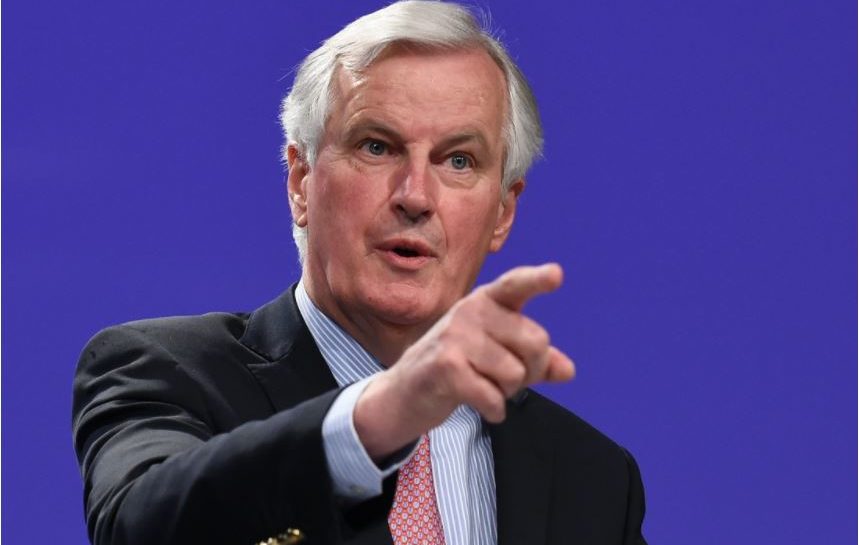Brexit: Michel Barnier Speech in Berlin – 29 November

[vc_row][vc_column][vc_column_text]
Excerpt from Speech by Michel Barnier at the Berlin Security Conference
Ladies and gentlemen,
The negotiations on the United Kingdom’s withdrawal are a complex task that we carry out with reason and determination, without aggression or naivety: ‘there is no place for Schadenfreude in Brexit’. There is neither revenge nor punishment in our mission.
My mandate comes under a framework laid down by the Heads of State or Government and by the resolutions of the European Parliament, all of whom wish for an orderly withdrawal of the United Kingdom.
We are awaiting sufficient progress from London on the following three points:
- the rights of European citizens in the United Kingdom and of British citizens in the EU;
- issues relating to the border between Ireland and Northern Ireland;
- fulfilment of the financial obligations entered into during the United Kingdom’s membership of the Union.
We are not there yet. The work on the three main subjects continues this week in a constructive spirit with the UK. The next European Council will take place in 15 days’ time. If real ‘sufficient progress’ is actually made, the European Council will be able to open the discussion a possible transitional period. Then the Member States will define in 2018 the framework of this new partnership with the UK.
We hope that this future relationship will be an ambitious one ! And we want security, defence and foreign policy as key components of it.
In April of this year, the Heads of State or Government stated their desire to establish a security and defence partnership.
After its exit from the Union, the United Kingdom will lose its decision-making powers at the European level and some levers for wielding influence.
It will, however, remain a permanent member of the UN Security Council and a member of NATO. It will remain a diplomatic, nuclear and military power.
We are linked by shared values and a common destiny, and we will remain so for the long term.
In the past, it is true to say that the United Kingdom has not been the spearhead of European defence. This is no secret to anyone.
- The British contribution to EU–led military operations is limited – barely 5% of the personnel deployed.
- The British have never wanted to turn the Union into a military power.
- The British have always resisted setting up a European Headquarters, although such a Headquarters would never compete with NATO.
But our future partnership must be conceived to fit the geopolitical situation of tomorrow, not the policy and differences of the past.
According to studies by the UK Ministry of Defence, by 2045 the major world powers will have doubled their defence budget. Some of them, such as China and India, may even have increased it fivefold.
Let’s consider the title of your conference, ‘Security and defence in unpredictable times’ – who can say for certain that Europe will still be a haven of stability in 10 or 20 years?
It is for us, Europeans, to maintain this stability and to promote our values around the world. Nobody is going to do it for us. And to me it seems obvious that we will be stronger if we cooperate to meet these challenges.[/vc_column_text][/vc_column][/vc_row][vc_row][vc_column][vc_tta_accordion color=”mulled-wine” active_section=”666″ collapsible_all=”true”][vc_tta_section title=”MICHEL BARNIER’S BERLIN SPEECH IN FULL” tab_id=”1512036433200-89aac405-367c”][vc_column_text]
Berlin, 29 November 2017
Mr. President,
Ladies and Gentlemen,
More than 500 days ago, the United Kingdom took the sovereign decision to leave the European Union and bring to an end 44 years of common history.
To many of us this came as a great shock.
It was a decision taken against the backdrop of a strategic repositioning by our American ally, which has gathered pace since the election of Donald Trump.
It was a decision that came after a series of attacks on European soil, committed by young people who grew up in Europe, in our countries.
It was a decision that came six months after the French Minister of Defence issued a call for solidarity to all his European counterparts to join forces to fight the terrorism of Daesh.
Never had the need to be together, to protect ourselves together, to act together been so strong, so manifest. Yet rather than stay shoulder to shoulder with the Union, the British chose to be on their own again.
Following the UK referendum, many people assured us that divisions would spread. Others predicted the victory of nationalist parties in the Netherlands, Austria and France. The weakening, or even dismantling, of the European project seemed an inevitability.
And yet, in an act of collective responsibility, Europeans suddenly woke up and responded by choosing unity. They affirmed their common project, even in one of the core areas of national sovereignty – security and defence.
To illustrate this wake-up call, let me quote the words of Chancellor Angela Merkel last spring: ‘Wir, Europäer, müssen unser Schicksal in unsere eigene Hand nehmen.‘
Yes, we need to take our fate into our own hands! In the face of threats that are increasingly diverse, intrusive and global, the Heads of State or Government decided to defend their continent by making common cause; giving priority to the protection of 440 million citizens; responding to the demands from three quarters of our compatriots who want Europe to play a bigger role in security issues.
In his first speech to the European Parliament in September 2014, Jean‑Claude Juncker, President of the European Commission, called for a relaunch of European defence. And I had the honour of working alongside him at that time as a special adviser on these issues.
We have come a long way since then! We need to keep this voluntarism.
- In June 2016, Federica Mogherini renewed our integrated approach with the Global Strategy on Foreign and Security Policy, which defines the Union’s level of ambition as a global player.
- In a historic declaration in July 2016, President Juncker, the President of the European Council Donald Tusk and NATO Secretary-General Jens Stoltenberg relaunched the strategic partnership between the European Union and NATO.
- In November 2016, Vice-President Jyrki Katainen and Commissioner Elżbieta Bieńkowska proposed a European Defence Fund so that defence technologies and equipment could be financed jointly from the European budget for the first time.
- In June 2017, we strengthened our capacity to plan and conduct external operations – including training missions in Mali, Somalia and Central African Republic.
- Also in June 2017, the Commission set out ideas for discussion on the future of Europe’s defence, even suggesting the establishment of a common defence.
- Most recently, on 20 November 2017 in Brussels, 23 Member States stated their intention of implementing the Permanent Structured Cooperation. This initiative, which owes a great deal to the personal determination of the German Minister Ursula von der Leyen, will serve to step up the commitment to European defence – in terms of capacity and at operational and industrial level.
Ladies and Gentlemen,
For the first time since the failure of the European Defence Community in 1954, we are witnessing an unprecedented effort to establish a Defence and Security Union. This is the roadmap we need to follow between now and 2025!
And this Defence and Security Union will have to be developed without the British, since on 30 March 2019 the United Kingdom will, as is its wish, become a third country when it comes to defence and security issues.
We must draw the appropriate legal and operational conclusions from this:
- The UK defence minister will no longer take part in meetings of EU Defence Ministers; there will be no UK ambassador sitting on the Political and Security Committee.
- The UK can no longer be a framework nation: it will not be able to take command of EU–led operations or lead EU battlegroups.
- The UK will no longer be a member of the European Defence Agency or Europol.
- The UK will not be able to benefit from the European Defence Fund the same way Member States will.
- The UK will no longer be involved in decision-making, nor in planning our defence and security instruments.
Everything I have just said is the logical consequence of the sovereign choice made by the British. We regret this vote. But we respect the choice that has been made.
***
In 2018 we will have to work on the framework of our new partnership with the United Kingdom. After – and only after – the detailed arrangements for and the principles of an orderly separation have been agreed. Soon I hope.
As for the future, I would like to stress two points:
- First, as Prime Minister Theresa May has said, the United Kingdom is leaving the Union, but not leaving Europe.
- Second, despite the UK’s withdrawal, we shall maintain our strategic capability: there will be no security vacuum in Europe.
There are three reasons for this:
- London’s withdrawal will not affect bilateral cooperation between certain Member States and the United Kingdom, particularly at operational level. The UK will for example continue to play a part in NATO’s Enhanced Forward Presence in Estonia and Poland.
- London’s withdrawal will not affect the strategic partnership between the European Union and NATO.
- After all, Theresa May has assured the Member States several times that the UK is committed unconditionally to maintaining European security.
I welcome this commitment and thank Theresa May for making it. History teaches us that there must be no horse-trading over the security of Europeans – that is an absolute necessity.
Ladies and gentlemen,
The negotiations on the United Kingdom’s withdrawal are a complex task that we carry out with reason and determination, without aggression or naivety: ‘there is no place for Schadenfreude in Brexit’. There is neither revenge nor punishment in our mission.
My mandate comes under a framework laid down by the Heads of State or Government and by the resolutions of the European Parliament, all of whom wish for an orderly withdrawal of the United Kingdom.
We are awaiting sufficient progress from London on the following three points:
- the rights of European citizens in the United Kingdom and of British citizens in the EU;
- issues relating to the border between Ireland and Northern Ireland;
- fulfilment of the financial obligations entered into during the United Kingdom’s membership of the Union.
We are not there yet. The work on the three main subjects continues this week in a constructive spirit with the UK. The next European Council will take place in 15 days’ time. If real ‘sufficient progress’ is actually made, the European Council will be able to open the discussion a possible transitional period. Then the Member States will define in 2018 the framework of this new partnership with the UK.
We hope that this future relationship will be an ambitious one ! And we want security, defence and foreign policy as key components of it.
In April of this year, the Heads of State or Government stated their desire to establish a security and defence partnership.
After its exit from the Union, the United Kingdom will lose its decision-making powers at the European level and some levers for wielding influence.
It will, however, remain a permanent member of the UN Security Council and a member of NATO. It will remain a diplomatic, nuclear and military power.
We are linked by shared values and a common destiny, and we will remain so for the long term.
In the past, it is true to say that the United Kingdom has not been the spearhead of European defence. This is no secret to anyone.
- The British contribution to EU–led military operations is limited – barely 5% of the personnel deployed.
- The British have never wanted to turn the Union into a military power.
- The British have always resisted setting up a European Headquarters, although such a Headquarters would never compete with NATO.
But our future partnership must be conceived to fit the geopolitical situation of tomorrow, not the policy and differences of the past.
According to studies by the UK Ministry of Defence, by 2045 the major world powers will have doubled their defence budget. Some of them, such as China and India, may even have increased it fivefold.
Let’s consider the title of your conference, ‘Security and defence in unpredictable times’ – who can say for certain that Europe will still be a haven of stability in 10 or 20 years?
It is for us, Europeans, to maintain this stability and to promote our values around the world. Nobody is going to do it for us. And to me it seems obvious that we will be stronger if we cooperate to meet these challenges.
Ladies and gentlemen,
In a position paper published early September, the United Kingdom made a rare statement in support of European defence policy. In this context, the UK seems willing to engage in the long‑term towards European cooperation.
On our side, we hope for an ambitious partnership in the interests of the Union, based – if I may put it this way – on three ‘B’s:
- a partnership that is broad: our cooperation must cover both conventional and asymmetric threats, such as cyber attacks;
- a partnership that is beneficial: our cooperation must contribute to strengthening the Union’s security and the Union’s strategic autonomy;
- a partnership that is balanced: we must ensure that we do not discriminate against third countries.
A partnership of this type must also comply with three principles laid down by the Heads of State or Government:
- A third country, however close it may be to the Union, may not lay claim to a status that is equivalent or superior to that of a Member of the Union.
- The Union’s decision-making autonomy must be respected; the United Kingdom may not decide on the use of certain capacities under the European flag.
- Any voluntary participation of the United Kingdom in European defence will confer rights and obligations in proportion to the level of this participation.
Our future partnership must lead to some very concrete outcomes. For example, it must enable:
- the voluntary participation of the United Kingdom in missions and operations carried out by the European Union, in terms of both personnel and strategic assets;
- the participation of the United Kingdom in joint armaments programmes and capability projects within the framework of the European Defence Agency, led by Jorge Domecq, together with industrial cooperation enabling these programmes to be implemented smoothly;
- exchanges between our intelligence services to support our external action;
- exchanges on cyber attacks and managing, preventing and responding collectively to such attacks.
We are well aware that European defence is an open project, with which several of our partners have been associated in accordance with our interests.
More than 25 partners have already participated in our external operations. The European Defence Agency cooperates with four States that are not Members of the European Union. Norway is one of the countries with which we cooperate closely.
We benefit from established plans, tried and tested practices and considerable experience. So we are not starting from scratch when it comes to defining a strategic partnership with the United Kingdom.
Ladies and gentlemen,
2018 will mark the 20th anniversary of the Saint-Malo summit, which was a founding summit for European defence.
In 1998, contrary to all expectations, after seven hours of negotiations the French and British leaders agreed on the need to give Europe the capability to act autonomously in order to manage crises in its neighbourhood and beyond.
I have always kept in mind the commitment made at Saint-Malo when working with some of you on the Convention on a Draft Constitution which became an integral part of the Treaty of Lisbon.
I am convinced that it is this spirit of Saint-Malo that should characterise the future defence and security partnership between the 27 Member States and the United Kingdom. Our aim: autonomous and united European defence. Which means a Union capable of acting by itself and always supportive in its alliances.
The construction of a ‘Europe of Defence’ has begun. Obviously, we will not wait for the United Kingdom to implement it, but when the time comes we will be ready to cooperate with the United Kingdom. This partnership will be in our best interests, since it is what the European citizens expect and it will contribute to the stability and security of our continent and our neighbourhood.
Thank you.
SPEECH/17/5021
[/vc_column_text][/vc_tta_section][/vc_tta_accordion][/vc_column][/vc_row]




